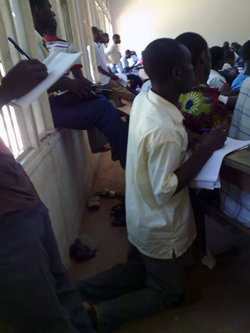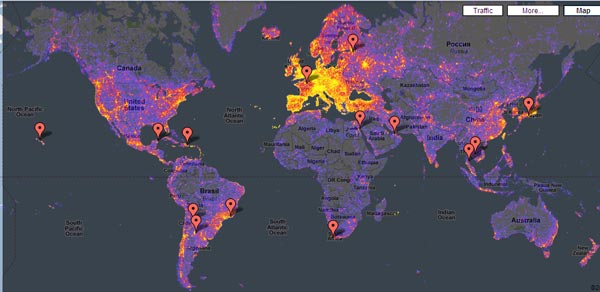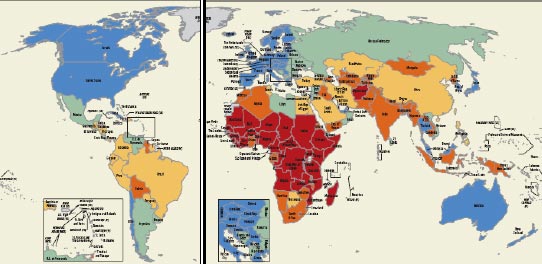“Africa far from reaching Millennium Development Goals”
News report on African Development Bank conference, May 28, 2010
“No country in sub-Saharan Africa is on course to achieve all the Goals by 2015.”
United Nations, Key Messages for September 2010 Summit
“It is easy to see that Sub-Saharan Africa lags on all the MDGs.”
World Bank and IMF, Global Monitoring Report 2010, full text download page here
Africa has had some successes and good news in the last decade, and has made much progress on some social indicators over a longer period. Why isn’t that reflected in this drumbeat of universal failure on the MDGs? The answer is that Africa was set up (probably unintentionally) to fail on the MDGs.
This set-up to fail is not well known, probably because you have to go through some really boring details to document it. One problem with the MDGs is that success on a goal is very sensitive to how you define the goal. There are actually three different choices you have to make to define a goal in 2015 relative to the 1990 baseline. Let’s use primary enrollment as an example, and say that a random country went from 50 percent primary enrollment in 1990 to 90 percent enrollment in 2015.
(1) Do you define the goal in CHANGES or in LEVELS (e.g. the change in primary enrollment from 1990 to 2015, or the level of primary enrollment attained in 2015)?
If your answer to (1) is CHANGES, you still need to make two more decisions:
(2) Will it be PERCENT CHANGE or ABSOLUTE CHANGE (e.g. percentage change in primary enrollment (90-50)/50=80%, or the absolute change (40 percentage points)?
(3) Will you use the USUAL social indicator or its REVERSE (e.g. percent enrolled OR percent NOT enrolled)?
(1) defines two possible indicators of LEVELS vs. CHANGES, and the different combinations of (2) and (3) create 4 different ways to define CHANGES. The MDGs did not make consistent choices, but actually use 4 out of the 5 possible combinations for MDGs 1 through 7, as shown in the table (where the actual indicator used is highlighted in yellow).

These choices are not neutral. Initial conditions determine whether a given choice makes it easier or harder to meet the Goal. Most obviously, if you have a LEVEL goal (primary enrollment, gender equality), the further away you are at the beginning, the harder it is to meet the goal. This was true for Africa for MDGs 2 and 3. (A plus sign shows whether each way of stating the goal would have INCREASED the probability of Africa making it, a MINUS sign indicates the choice of goal made it harder for Africa, relative to other countries with different initial conditions).
If you have a high initial level then a PERCENTAGE DECREASE is harder to achieve. This was true for poverty (MDG 1) and child mortality (MDG 4) in Africa. It was also true for MDG 7, because the REVERSE INDICATOR was used (percent WITHOUT clean water instead of the USUAL INDICATOR: percent WITH clean water).
If you have a low initial level, on the other hand, a PERCENTAGE INCREASE would be easier to achieve. If the MDGs had been set in terms of PERCENT CHANGE in the USUAL INDICATOR (as it was for MDGs 1 and 4), then Africa would have easily met MDGs 2,3, and 7 on primary enrollment, gender equality in enrollment, and percent with clean water, and all of the above statements about universal African MDG failure would be nonsense.
Instead, each of the goal choices made for MDGs 1, 2, 3, 4, and 7 made it HARDER (if not impossible) for Africa to meet the goals, compared to alternative, equally plausible choices. ANY consistent choice of goal type except LEVELS would have made it easier for Africa to meet some of the goals.
The craziest statements implicitly made above are that Africa is failing on MDGs 5 and 6 (67% reduction in maternal mortality and reversing spread of AIDS), since there were NO data on these indicators for the benchmark year of 1990 (actually hardly ANY reliable data for any year until very recently).
So this is SO boring, and who cares? Nobody, apparently, because the sweeping statements about Africa failing are made every year without anyone bothering to check the details. Because Africa ALWAYS fails, right?
I published an academic paper on all this here in 2009, with a working paper version available since 2007. Michael Clemens and Todd Moss and Clemens, Moss, and Charles Kenny had made related criticisms as early as 2004-2005. Michael Clemens in 2004 described how Africa's progress in education was impressive by both historical and contemporary standards. The MDG crowd are aware of these papers. For example, the World Bank and IMF quote them in their recent Global Monitoring Report 2010 . This report acknowledges “what low-income countries {mainly African} achieved before the crisis {on the poverty and social indicators} is indeed remarkable.” But this point was soft-pedaled and has had no effect on the endlessly reiterated "Africa fails on all MDGs" line.
I think the MDG design was unintentional after some conversation with the original creators of the goals, who did not intend the MDGs to be applied at the regional or country levels. What is less forgivable is the aquiescence in making Africa look like a failure after the bias was clear to anyone who would bother to check. Of course, there are areas and time periods where Africa has done badly, but is that any reason to take the successes and make them look like failures?
 The Wall Street Journal has a great map feature today in its New York section showing where each World Cup country's nationals live in New York City.
The map to the left shows the Ghanaians in New York in green. Morris Heights in The Bronx seems to lay the strongest claim to a Little Ghana, although there are also outposts in the Lower East Side, Brooklyn, and Staten Island. The soccer balls show where there are bars or restaurants showing the World Cup -- looks like not manysuch bars available in Little Ghana.
The Wall Street Journal has a great map feature today in its New York section showing where each World Cup country's nationals live in New York City.
The map to the left shows the Ghanaians in New York in green. Morris Heights in The Bronx seems to lay the strongest claim to a Little Ghana, although there are also outposts in the Lower East Side, Brooklyn, and Staten Island. The soccer balls show where there are bars or restaurants showing the World Cup -- looks like not manysuch bars available in Little Ghana. From Aid to Equality
From Aid to Equality















